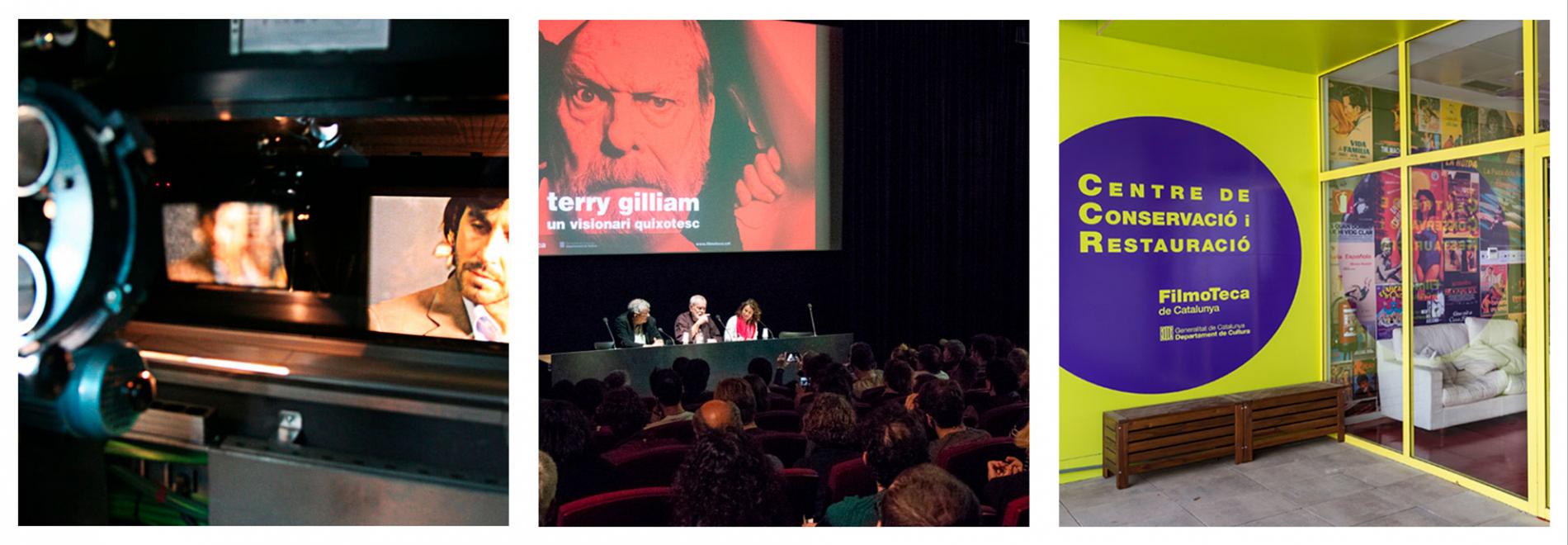Coneix-nos
Introduction
The Filmoteca de Catalunya oversees the preservation and dissemination of our audiovisual and film heritage and culture, with special emphasis on Catalonia. Its activities include the programming of film projections and exhibitions, the preservation and restoration of films, photographs, music, books, magazines, posters and cinematographic documents, and museum pieces relating to the history of cinema.
Since 2012, the Filmoteca de Catalunya has had two new centres for implementing its functions. El Centre de Conservació i Restauració, located in the Audiovisual Park in Terrassa, houses the film collection, which currently consists of around 40,000 titles in both analogue and digital formats. The building in the Raval, in the centre of Barcelona, has two projection rooms where it screens some 1,400 sessions per year, plus two exhibition halls and the Film Library, which holds the largest collection in Catalonia of film-related books, magazines and graphic archives. The Filmoteca also carries out activities promoted by the Education Services which are geared towards educating new audiences.
A brief review of the history of the Filmoteca de Catalunya
The Filmoteca de Catalunya was originally an outpost of the then National Film Library of Spain and used to hold weekly screenings at the ABC Cinema in Barcelona, between 1963 and 1967, then daily screenings from 1972 in a hall on Carrer de Mercaders, and from 1979, at the Cinema Padró. Around the same time a film archive was started up and it published its own programme and publications.
As of 14 December 1981, now institutionalised as the Filmoteca de Catalunya and attached to the Catalan Ministry of Culture, the showings were moved to the assembly hall of a religious school on Travessera de Gràcia. In 1983, the first films destined for the Archive were transferred, which soon became the repository of other public and private collections.
In 1991, the screenings were moved to the old Cinema Aquitània on Avinguda de Sarrià, and the Archive was housed in new rooms in the La Campana building. The Film Library, which originated from the Filmoteca Nacional and was expanded with the acquisition of the collections of Miquel Porter Moix (CO.CI.CA), was further enriched after 1997 by its merger with the Delmiro de Caralt Library.
Attached first to the Entitat Autònoma d’Organització d’Espectacles i Festes (the Catalan Government department responsible for shows and festivals) and currently – since 2002 – to the Catalan Institute for Cultural Companies (ICEC), the Filmoteca de Catalunya has been managed successively by Miquel Porter i Moix (10/1981-6/1986), Antoni Kirchner i Masdeu (6/1986-8/1997), Natàlia Molero i Lloret (9/1997-5/2000), Roc Villas i Ventura (5/2000-12/2009), Esteve Riambau i Möller (1/2010-6/2024) and, since 2024, by Pablo La Parra Pérez.
A full member of the International Federation of Film Archives (FIAF) since 1992, today it has around 200,000 audiovisual items in the form of photochemical film, video tapes and digital files (the most noteworthy being the films of Segundo de Chomón, the newsreels of Laya Films, and classics of Catalan cinema), 60,000 books, 30,000 posters and around 400,000 photographs, plus an annual screening audience of close to 140,000 people.
The new building in the Raval district, opened in February 2012, rounds off the offering of public cultural facilities in the heart of Barcelona, while at the same time concentrating and optimising the Filmoteca’s services with a cross-cutting range of activities including two screening rooms, the Chomón and the Laya (with 360 and 175 seats respectively), space for temporary and permanent exhibitions, a specialist library, offices, a cafeteria and a bookshop. In July 2013 the new Preservation and Restoration Centre was opened in Terrassa to guarantee the preservation of Catalonia’s audiovisual heritage. Both facilities were the hosts, in 2013, of the 69th Congress of the International Federation of Film Archives (FIAF), with the participation of 400 accredited delegates from one hundred film companies in 60 countries.
Objectives and challenges of the Filmoteca de Catalunya
In line with the technological and social changes that regularly take place in the film world, the Filmoteca de Catalunya needs to be able to respond to the new challenges that arise in both the preservation and dissemination of its film heritage.
Digitisation, which is already well established in film production and exhibition, has consolidated film libraries as the centres for photochemical film preservation, being much more reliable in the long term. At the same time, however, new digital productions must also follow the standards and protocols established to guarantee their long-term preservation. Both these procedures are undertaken by the Preservation and Restoration Centre of the Filmoteca de Catalunya. The Raval centre also has analogue and digital screening systems that respect the original formats, according to technical availability. In addition to the materials themselves, film libraries have also become the only places for preserving cinematic entertainment exactly as it was first conceived in the twentieth century.
The concentration of activities at the Raval centre confirms the Filmoteca as the authoritative cultural facility for the study and knowledge of the film world. The screenings combine classical cinema with contemporary films that do not generally reach commercial screens. The presence of guest speakers at screenings and discussions turns these sessions into unique events that have a wider impact thanks to the role of the cinema as an instrument for social dialogue and other arts. The Film Library also provides the information necessary to complement these screening sessions, which can either be consulted in person or through the digital repository, which was launched in 2013 and is constantly being updated. In addition, previously unseen document collections are displayed in the exhibition spaces, consisting mainly of in-house productions. The Education Services, inherent to any large facility of this kind, educate new film audiences through its ‘Filmoteca per a les Escoles’ programmes, the Aula de Cinema for university students, and one-off actions carried out across the region. The FilmoXarxa, created in 2018, also underpins the national dissemination of the Filmoteca’s activities through screenings organised in collaboration with Federació Catalana de Cineclubs.


